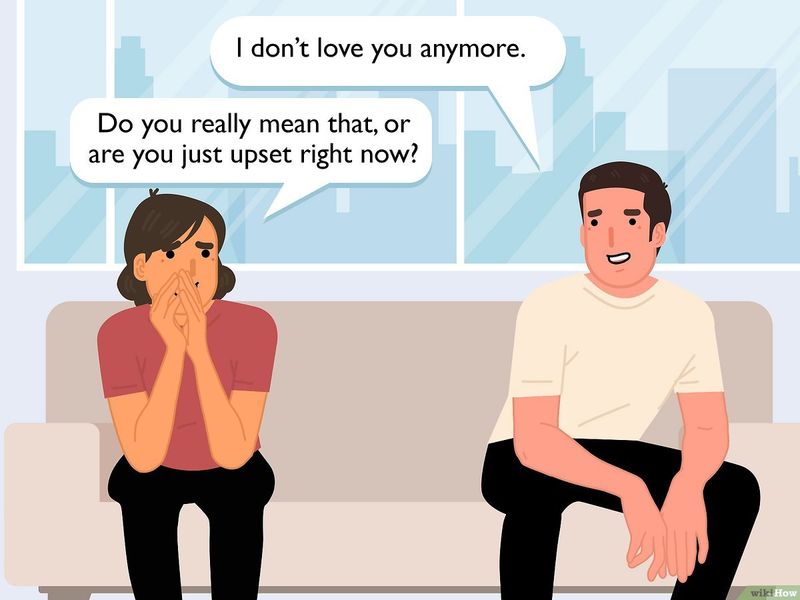18 Subtle Clues He’s Not As Great A Husband As You Think

Marriage often reveals its nuances in whispers rather than shouts. Many women find themselves overlooking subtle signs of emotional neglect or disconnection from their husbands, normalizing these behaviors over time.
This guide aims to empower women by identifying 18 understated clues that suggest a husband may not be as great as he seems.
These signs don’t scream for attention but, once noticed, can’t be ignored. By recognizing these red flags, women can better understand the dynamics of their relationships and foster a more fulfilling connection.
1. He’s nice to others, but short-tempered with you

Caught in the warmth of his smile, others might never guess that his temper flares at home. In public, he seems the epitome of charm and kindness. Yet, behind closed doors, his demeanor shifts unpredictably, leaving her walking on eggshells.
This dual behavior is unsettling. It’s as if she’s constantly trying to appease a different person from the one everyone else knows. The contrast is stark and bewildering, often leaving her isolated in her experience.
Suspicion gnaws at her heart, and confusion blurs reality. She wonders if she’s imagining things because how could her charming husband harbor such bitterness? This façade can mask deeper issues, urging her to question what lurks beneath.
2. He expects praise for basic involvement

It’s the little things—washing a dish, taking out the trash—that he treats as heroic feats. His expectation of a standing ovation for such tasks feels oddly misplaced.
While partnership means sharing chores, his need for validation suggests a deeper imbalance. She wonders why routine contributions warrant such fanfare. The imbalance subtly undermines the essence of partnership.
His insistence on praise reveals a fragile ego seeking constant affirmation. It raises a flag—a small, yet telling indication that he might not fully grasp equality in partnership. This neediness can erode mutual respect, leaving her feeling more like a cheerleader than a partner. This demand for admiration hints at a skewed perspective.
3. He only apologizes when pressed—never first

The art of apology escapes him until nudged. It’s never easy, watching him wrestle with his pride before conceding a half-hearted ‘sorry.’
His reluctance to initiate apologies signals a deeper struggle with accountability. Genuine remorse seems elusive, and her emotions often feel dismissed. This pattern is more than a reluctance; it’s a refusal to acknowledge her hurt.
She yearns for sincerity, not coerced words. The absence of heartfelt apologies highlights a gap between them. His words may come, but always a step too late, leaving her to question his empathy. This reluctance to own up shows a lack of emotional maturity, hinting at a troubling void.
4. You feel invisible during his high moments

In the glow of his triumphs, her presence fades into the background. Whether it’s a work promotion or personal achievement, his world celebrates without her.
Feeling invisible during these moments is a silent, yet painful exclusion. Her contribution to his success is overlooked, as if she stands in the shadow of his accomplishments.
The loneliness of these times stings, marking a disconnect in their shared journey. Her silent support remains unacknowledged, leaving her questioning her role. In these high moments, the lack of shared joy reveals the cracks in their partnership. This oversight hints at a deeper emotional divide.
5. He doesn’t ask about your day anymore

Her day unfolds in silence as his curiosity wanes. Once, he listened intently, crafting a shared narrative of their days. Now, her stories go untold, meeting only his unseeing gaze.
This absence of inquiry whispers of disconnection. The once eager exchanges are replaced by his indifference, marking a retreat into separate worlds.
She misses the simple act of sharing, the acknowledgment of her daily experiences. The quiet at the dinner table becomes a metaphor for their growing distance. This neglect of her world is a subtle, yet telling sign of emotional withdrawal, leaving her to wonder what else he’s stopped seeing.
6. He turns every disagreement into a character assassination

Disagreements should be about issues, not identities. Yet, every conflict spirals into an attack on her character.
His words sting, not for their volume, but for their personal nature. Every argument feels like a trial, where her flaws are the evidence. This blurring of disagreement and personal attack erodes trust.
She feels judged, not understood, as if defending herself rather than resolving the issue. The real problem gets lost in the whirlwind of accusations. This pattern of conflict signals a deeper issue, hinting at a lack of respect and empathy. His inability to separate issues from identity leaves her wary and worn.
7. He brings up past favors to shut down current complaints

Past favors become currency in their conversations, a shield against her current concerns. Rather than addressing her feelings, he counters with a ledger of past deeds.
This tactic dismisses her experiences, turning a plea for understanding into a transactional negotiation. The weight of past actions overshadows present issues, creating a barrier to genuine communication.
Her voice feels drowned in the echoes of ‘I’ve done this for you.’ This pattern reflects a refusal to engage with her reality. Instead of connection, she finds herself trapped in a cycle of past debts. This dynamic erodes trust, leaving her questions unanswered.
8. Your emotional needs are seen as “too much”

Her emotional landscape feels vast and undiscovered by him. Whenever she seeks reassurance or understanding, she’s met with a sigh—her needs labeled as excessive.
This dismissal stings, reducing her genuine desires to overbearing demands. She begins to doubt her worth, questioning if her needs are unreasonable. The imbalance is clear, as his emotional comfort takes precedence.
This perception of her needs as burdensome signals a lack of empathy. It whispers of an unwillingness to engage with her world. Her emotional isolation grows, leaving her longing for validation. This dynamic suggests a troubling mismatch in emotional availability.
9. He shows more affection online than in real life

Online, his affection paints a picture-perfect relationship. Hearts and likes flow freely, yet in person, his warmth is scarce. The digital love story contrasts sharply with their offline reality.
This discrepancy leaves her feeling disconnected, as if she’s living with two different versions of him. His public gestures mask a private indifference, a façade that fools others but not her.
The lack of real-world affection suggests a deeper issue. She’s left questioning the authenticity of their bond, wondering why online displays replace genuine connection. This digital divide reveals a chasm in their relationship, one that likes and comments can’t bridge.
10. He remembers what matters to him—not to you

His mind is a vault for sports stats and hobby details, yet her important dates slip through unnoticed. His selective memory highlights a stark difference in priorities.
This forgetfulness isn’t innocent; it’s a reflection of what he values. Her milestones fade into the background, overshadowed by his interests.
The hurt of these oversights accumulates, each forgotten date a reminder of her secondary place. She yearns for reciprocity, for her world to matter as much as his does. This pattern reveals a misalignment in what they cherish, pointing to a deeper disconnect in their relationship.
11. He zones out when you talk about things you care about

Her passions ignite, but his attention flickers and fades. As she speaks, his eyes glaze over, interest waning. This inattentiveness chips away at her enthusiasm.
The moments she cherishes go unnoticed, leaving her feeling unheard. His lack of engagement isn’t just disinterest; it’s a dismissal of what makes her unique.
She longs for his attentiveness, for shared enthusiasm in her pursuits. Instead, she finds a widening gap, a silence where encouragement should be. This indifference suggests a deeper emotional disconnect, leaving her desires unmet and her voice echoing unanswered.
12. He treats your interests like distractions

Her passions are mere interruptions to him, not pursuits worthy of respect. Every brushstroke or novel chapter is met with a dismissive wave.
This attitude reduces her creativity to a mere distraction, undermining her efforts. His disregard for her interests belittles her individuality, chipping away at her self-worth.
She craves support, someone who sees her passions as integral to her identity. Instead, she faces indifference, a quiet erosion of her enthusiasm. This belittling stance suggests a lack of appreciation, a troubling sign of emotional imbalance in their relationship.
13. He never seems to really “see” you

In his gaze, she feels unseen. Though present, his eyes don’t meet hers, preoccupied with screens or distant thoughts.
This lack of attention speaks volumes. It suggests a disconnection that’s deeper than words. She seeks recognition in his eyes, a simple yet profound acknowledgment of her presence.
Her heart aches for that connection, for moments where she’s truly seen and appreciated. Instead, she faces a quiet neglect, a feeling of being overlooked. This absence of acknowledgment is a silent, yet powerful indication of a faltering bond.
14. He’s defensive when you bring up feelings

Exploring emotions feels like navigating a minefield. Her attempts at open conversation often meet with his defensiveness, a wall that rises abruptly.
His sensitivity shifts the focus, leaving her feelings unattended. She longs for understanding, for a space where her emotions are met with empathy, not resistance.
This defensiveness isn’t just a barrier; it’s a signal of deeper emotional fragility. It suggests an unwillingness to engage with vulnerability, stifling their connection. Each defensive moment builds a wall, separating their hearts even further.
15. His compliments often feel like control in disguise

His words are sweet, yet something feels amiss. Compliments carry an undertone, a subtle suggestion for change.
This hidden control in his words leaves her questioning his sincerity. Praise should uplift, but his often comes with strings attached, whispering of expectations rather than admiration.
She desires genuine affirmation, free from underlying motives. Instead, she finds herself deciphering his intentions, wondering why his compliments feel more like directives. This pattern hints at a lack of authenticity, suggesting an attempt to mold rather than love.
16. You feel lonelier with him than without him

Loneliness whispers even in his presence. The silence between them stretches, more isolating than solitude. She longs for connection, yet the emotional distance grows, leaving her lonelier than if she were alone. His presence is a reminder of what’s missing, the intimacy that’s faded.
This loneliness within companionship highlights a fundamental disconnect. It’s a stark reminder that proximity doesn’t equal closeness. She yearns for genuine connection, a bond where she feels truly understood and valued.
17. He jokes about your feelings instead of taking them seriously

Her feelings become punchlines in his humor, dismissed with a laugh rather than understood. He turns her vulnerability into jest, masking discomfort with levity.
This deflection undermines her emotions, reducing them to mere subjects of amusement. She seeks solace, but finds only trivialization of her concerns.
The laughter stings, a reminder of his inability to engage with her reality. She longs for serious attention, for her feelings to be heard and respected. This pattern reveals a reluctance to face emotional truths, signaling a deeper disconnection.
18. You catch yourself making excuses for him more than you should

Every misstep finds a justification on her lips—’he’s just tired,’ or ‘he didn’t mean it.’ These excuses slip out almost habitually, masking her discomfort.
This pattern of defense hints at underlying issues. Her need to justify his behavior suggests a reluctance to confront reality, a hesitation to acknowledge his flaws.
She worries over these excuses, realizing they cover deeper dissatisfaction. Instead of addressing the core issues, she finds herself smoothing over the cracks. This habit signals a troubling acceptance of less than she deserves, a quiet surrender to unfulfilled expectations.
